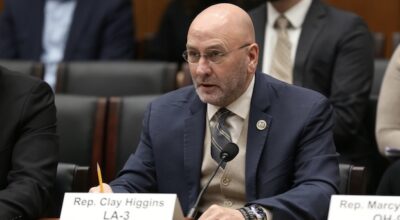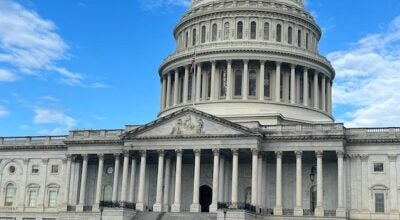Agriculture commissioner candidates pitch platforms
Published 6:00 pm Wednesday, September 28, 2011
Each of the three candidates for state agriculture commissioner has a different focus.
For Mike Strain, who is seeking his second term, the focus is job growth. Jamie LaBranche’s is medical agriculture crops. Belinda Alexandrenko wants to offer farmers hands-on assistance.
“Agriculture is the largest sector of Louisiana’s economy, and we want to continue to see that grow in our state and provide more jobs,” Strain said to the American Press. “We need to achieve profitability, net growth and jobs, not only in rural and urban areas, but suburban, as well.”
The agriculture, forestry and aquaculture industries use more than 85 percent of the surface area of the state and employ more than 243,000 people — nearly 10 percent of the state’s workforce, Strain said. The agriculture and forestry industries account for more than $30 billion, he said.
Mounts Of Experience
Strain, a Republican from Covington, was born and raised on a cattle farm and received a veterinary medicine degree from LSU in 1983. He is a former state representative for District 74 and served on the Agriculture Committee and headed the Legislative Rural Caucus, according to the Louisiana Department of Agriculture and Forestry website.
To ensure the future of farming — the average age of the Louisiana farmer is 57 — Strain said agriculture officials must work with farmers and agribusinessmen to make agriculture more efficient and expand services.
“Our goal now is put a farmer in every field and continue to grow our agriculture economy,” he said.
During his first term, Strain said reviewed department programs, policies, contracts and fees in an effort to ensure maximum efficiency and eliminate duplication.
“We want to continue to strive to be good stewards of the public money and expand agriculture and grow jobs,” he said.
The future of agriculture does face significant national challenges, Strain said.
The United National Population Division project said that global population could reach 9.3 million by mid-century and rise to 10.1 billion by 2010.
“We must feed, clothe, house and provide energy worldwide to meet this growing demand, and this will result in a tremendous economic impact to all of America,” Strain said.
Medical Agriculture
As an arborist and horticulturist, LaBranche said he wants to make Louisiana the largest provider of medical agriculture in the nation.
“We need to create crops in the medical industry so that farmers can grow … so that agriculture can grow,” LaBranche, a Democrat from LaPlace, said to the American Press. “Louisiana has the right climate and soil structure to cultivate many of medical plants, including the poppy.”
Under his plan, thousands of agriculture jobs could be created and billions of dollars in new revenue brought into the state, he said.
“Louisiana will be to the pharmaceutical industry as to what Silicon Valley is to the technological industry,” he said on his website.
Louisiana would partner with the private sectors to implement the largest medical agriculture program in North American, LaBranche said.
Other “untapped resources” which could be grown and processed locally, include the saw palmetto, elder, passion flower and willow bark, all native to Louisiana, LaBranche said. Other medical crops could include ginger, butterbur, kava, ginkgo, aloe and pomegranate.
“These are plants that are growing good here and nobody is doing anything with them,” he said. “We can lead the way into the 21st century with medical agriculture fields.”
LaBranche also wants to abolish the state’s child fishing and hunting tax.
“I believe if a father wants to spend quality time with his children, he should not have to be taxed for it,” he said. “As a Cajun, I spent my quality time growing up fishing and hunting with my father, and it was at those times that he instilled in me the values of being a man, the principals of hard work, honesty and integrity.”
LaBranche also wants to return agricultural studies to the public schools, focusing on juniors and seniors. The program would include a two-year horticulture studies program where students could retain a license of certification upon completion. Those students would graduate with a skilled trade, he said.
Another incentive is to create a state-of-the-art market place to revitalize the Gulf Coast seafood industry.
“This market would allow Louisiana fishermen to bring in their fresh catch for market,” he said. “It would also allow them to instantaneously advertise their goods on the Internet using a nationwide database of restaurants, supermarkets and other seafood processing industries.”
This is his first run for office.
New Vision
Alexandrenko wants to add vision and creative energy and become a stronger advocate for farmers and ranchers by offering them hands-on assistance, she said in a news release.
Alexandrenko serves as the chairwoman of the Reform Party of Louisiana and is a gardener, consultant, writer, public speaker, educator, mother and entrepreneur. She also hosts a live radio show four days a week, she said in a news release.
The Lafayette resident ran for governor three times — twice against former Gov. Mike Foster and against Gov. Bobby Jindal. She notes her life experience and work have prepared her to become the state’s top agriculture agent.
Alexandrenko has worked for the state Departments of Natural Resources and Environment Quality and the LSU Agriculture Center.
Her education includes studies at Louisiana College, LSU Graduate School, Harvard School of Public Health, Yale Campaign School for Women and the Tulane School of Public Health and Tropical Medicine, where she specialized in infectious disease control, international health and environmental health, according to information provided by her campaign.
Alexandrenko said her policies are aimed at helping the state’s farmers, ranchers and foresters cope with climate extremes. She said climate changes Al Gore talks about have not been proven scientifically accurate.
“In fact, there are several sources that have debunked this theory. There have always been cycles of climactic conditions that impact farmers, ranchers and foresters. States like Kansas, Texas, Nebraska, Oklahoma and Missouri grow sorghum as a hedge against drought.
“This water-efficient crop is more drought-tolerant and requires fewer inputs than corn. Policies that allow these producers to do what they do best would be in order; these policies I would strongly support. In order to facilitate production and distribution, we need to have fewer federal versus local government regulations,” she said in a news release.
Alexandrenko also seeks to promote Louisiana manufactured products.
“We should have diversification of the food supply, not (the) centralization of it,” she said. “We need to look at current governmental policies, which may hinder diversification.”
Another area in which she wants to see change is the impact the Food Safety Act S510 has on farmers, ranchers and foresters as it applies to land use and inspection.
“Why it was not put under the (state) Department of Agriculture and Forestry, instead of under Homeland Security and the Defense Department, is curious,” she said.
Alexandrenko said she believes the conservation of soil and water should be part of the mission of state agriculture officials.
“While it is vital to be careful of soil and water conservation, it is best left to the private producers, not by intermingling governmental agencies with private corporations,” she said. “Private-public partnerships seem to impede these endeavors and not allow our entrepreneurial spirit to thrive.”
She said feedback from such producers has to be considered in all policy-making decisions.
Alexandrenko supports taking steps to do what it takes to curtail over-regulation by the federal government to make it easier for farmers, ranchers and foresters to continue their operations.
“A common complaint from those trying to produce is that the regulations are halting their efforts,” she said.





